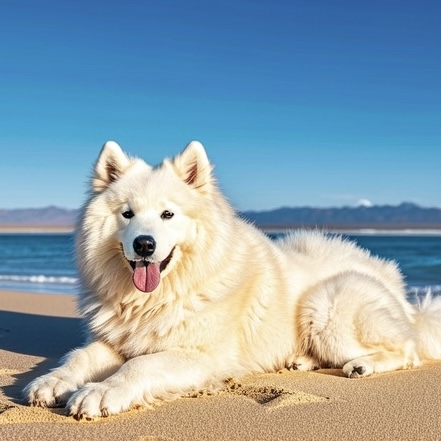
by TCMVET | Feb 3, 2024 | Dog Cancer & Tumors
Oral cavity tumors in dogs present a challenging health issue that mirrors similar conditions in humans. As our canine companions suffer from these rapidly growing malignant neoplasms, pet owners and veterinarians alike are turning towards holistic approaches to complement conventional treatments. One such approach that has gained attention is the integration of Traditional Chinese Medicine (TCM) into the veterinary care regimen. This article explores how TCM can be utilized in the fight against canine oral cancer, and what benefits it may hold for our beloved pets.
Understanding Oral Cavity Tumors in Dogs
Oral tumors in dogs can be aggressive and often exude high levels of insulin into the bloodstream, leading to weakness and potential neurological problems. Symptoms can range from lethargy to complete loss of consciousness, with breeds like Boxers and Airedales being at higher risk. With the randomness of insulin release, diagnosis and management can be particularly difficult.
The Role of Traditional Chinese Medicine
Traditional Chinese Medicine, with its thousands of years of history, offers a different perspective on health and disease. TCM is based on the concept of balancing the body’s Qi (vital energy) and focuses on treating the underlying imbalances that lead to disease, rather than just the symptoms. When it comes to oral cavity tumors in dogs, TCM aims to enhance the body’s natural defenses and support the immune system to fight cancer cells.
Herbal Remedies and Their Applications
Chinese herbal medicine utilizes a variety of plants and natural substances known for their therapeutic properties. Herbs like Huang Qin (Scutellaria baicalensis) and Ling Zhi (Ganoderma lucidum) have been noted for their anti-inflammatory and anti-cancer properties. These herbs, when prescribed by a qualified veterinary herbalist, can be integrated into a treatment plan that may include surgery, chemotherapy, or radiation.
The Benefits of a Holistic Approach
Incorporating TCM into a canine cancer treatment plan can offer multiple benefits:
- Alleviation of Symptoms: Herbal remedies can help manage symptoms such as inflammation and pain, improving the quality of life for dogs undergoing cancer treatment.
- Strengthening the Body: TCM aims to strengthen the body’s own healing mechanisms, which can be especially beneficial for older dogs or those with weakened immune systems.
- Reducing Side Effects: When used alongside conventional treatments, TCM can help mitigate the side effects associated with chemotherapy and radiation.
Consultation with Professionals
It is crucial to consult with a veterinary professional trained in TCM before administering any herbal remedies to your pet. An expert can provide a tailored treatment plan that takes into account the unique health profile of your dog.
While the integration of Traditional Chinese Medicine into veterinary practice is still in its formative stages, early adopters and anecdotal evidence suggest potential benefits that warrant further scientific exploration. By offering a complementary approach to conventional treatments, TCM may provide a more rounded and gentle option for managing oral cavity tumors in dogs.

by TCMVET | Feb 2, 2024 | Dog Cancer & Tumors
I. Types of Canine Tumors and Their Identification
Dogs, like humans, can develop various types of tumors. Identifying them early can be crucial for effective treatment. Here are some common types:
- Surface Tumors: These appear as raised bumps, small nodules, or cauliflower-like growths on the skin. They tend to grow slowly, eventually bursting as they enlarge.
- Subcutaneous Tumors: These lumps beneath the skin may protrude above the surface. Some are movable and hard to the touch. Malignant tumors in this category tend to grow continuously, while benign ones grow slowly.
- Mammary Tumors: Often presenting as discrete, hard nodules, mammary tumors in dogs are typically mixed-type and grow slowly, although they can be numerous.
Other less common tumors include lymphomas, gastrointestinal tumors, and osteosarcomas.
II. Diagnostic Tests for Canine Tumors
Several diagnostic methods are recommended, but not all may be necessary. The choice depends on the veterinarian’s advice:
- Aspiration/Biopsy for Cytology
- Complete Blood Count
- Inflammatory Response Protein Tests
- Biochemical Profiles
- Abdominal Ultrasound and Chest Radiography
- MRI and other advanced imaging
III. Treatment Options for Canine Tumors
- Surgical Removal: This involves excising the tumor to eliminate the source of the disease. However, since tumors can spread through blood and lymphatic systems, there’s a risk of recurrence. Post-surgery, it’s important to focus on consolidation and anti-inflammatory treatments to prevent relapse.
- Chemotherapy and Radiation: Depending on the severity of the tumor, a course of 3-24 sessions may be prescribed. Nutritional support and organ protection are crucial, as the side effects, especially after the second cycle of chemotherapy, can be severe. This method can be thorough, with both benefits and drawbacks.
- Targeted Therapy: Combining surgery and chemotherapy in stages, especially in severe cases where a single method is not effective.
IV. Common Medications for Canine Tumors
- “Sunuo and Ganxuewei”: Commonly used due to the inflammatory reactions and anemia caused by tumors.
- “Hengcaofensu”: A reputable medication, often prescribed in veterinary hospitals, contains ingredients that can suppress tumor growth and enhance the dog’s immune system to fight the tumor.
The treatment and medication should always be tailored to the dog’s specific condition and health status, rather than a one-size-fits-all approach.

by TCMVET | Feb 2, 2024 | Dog Cancer & Tumors
Just like humans, dogs of any breed and age can develop tumors. Being informed about the common types of tumors in dogs can help pet owners be better prepared and respond promptly in case of such health issues. Here are the six most common tumors found in dogs:
- Mast Cell Tumors: One of the most common skin tumors in dogs, mast cells are a type of immune cell associated with allergic reactions and inflammation. Symptoms can resemble those of an allergic reaction, such as surrounding skin becoming red and swollen, increased bleeding tendency due to higher blood vessel permeability, and potentially severe complications like stomach ulcers, low blood pressure, and shock.
- Lipomas: These are generally benign tumors found in the subcutaneous tissues. Lipomas typically appear as distinct lumps under the skin, often found on the chest, back, and proximal limbs. While mostly benign, if a lipoma grows, certain anti-tumor medications, such as Zhongliu Kuai Xiao Beef Tablets, can be used to inhibit its growth.
- Squamous Cell Carcinomas: This type of tumor affects both dogs and cats, usually appearing on the head, nasal plane in cats, and nasal plane, skin, and interdigital areas in dogs.
- Lymphoma: Among the most common tumors in dogs, lymphoma can occur in the lymph nodes, spleen, and virtually any other organ. Early symptoms like fever, loss of appetite, and weight loss are often subtle, and by the time the disease is typically detected, it has usually reached an advanced stage with enlarged lymph nodes. Lymphoma is one of the few tumors that respond well to chemotherapy.
- Melanomas: These tumors can occur anywhere on a dog’s body. Benign melanomas are more common on hairy skin, while malignant melanomas are often found in the mouth, mucocutaneous junctions, and interdigital areas.
- Mammary Tumors: In the early stages, mammary tumors may not affect a dog’s eating habits or general demeanor but will grow over time. A noticeable hard lump can be felt in the dog’s abdomen, and when the tumor grows large enough to stretch the skin to its limit, it may rupture, releasing a foul odor.
It’s vital for dog owners to watch for these symptoms and seek veterinary care promptly. Regular check-ups and screenings are the best way to detect and address any potential health issues early on. Remember, early detection can make a significant difference in the management and outcome of these conditions.

by TCMVET | Feb 2, 2024 | Dog Cancer & Tumors
Tumors, often synonymous with disaster in human health, are equally concerning for our beloved pets. As our living standards improve, the incidence of tumors in both humans and dogs continues to rise. As responsible pet parents, it’s crucial to remain vigilant and regularly monitor our furry companions for any signs of trouble. In this article, we’ll address some common questions related to canine tumors, including their early symptoms, types, and available treatment options.
- Early Symptoms of Pet Tumors:
- Visible Signs (Manifest):
- Presence of unexplained lumps, masses, or cysts.
- Recurrent fever.
- Rectal bleeding, difficulty in defecation, and slow-healing wounds.
- Swallowing difficulties, labored breathing, coughing, and vomiting.
- Limping without apparent injury.
- Hidden Symptoms (Latent):
- Depressed mood and reduced activity.
- Loss of appetite or refusal to eat.
- Unexplained gagging, trembling, or post-defecation discomfort.
- Easily startled and shaking, even without obvious triggers.
- In cases displaying any of these symptoms, prompt medical attention is advised, including pathological biopsies.
- Types and Characteristics of Canine Tumors:
- Lipoma: Generally found on the body’s surface, potentially invasive but not deep-seated, often slow-growing, but vigilance is essential. More common in older dogs.
- Papilloma: Common on the skin, mouth, eyelids, paw pads, and between toes, usually benign and caused by a virus but not transmissible to humans.
- Mast Cell Tumor: Occurs more frequently in older dogs, presents as smooth, round growths, resembling warts but considered malignant.
- Melanoma: Common in the oral cavity and around the nails, malignant, and can spread to internal organs, posing significant treatment challenges.
- Lymphoma: Frequently seen in Golden Retrievers, malignant, and typically affects the lymph nodes, liver, and spleen.
- Most Common Canine Tumors and Susceptible Breeds:
- Lymphoma: Golden Retrievers.
- Hemangiosarcoma: Golden Retrievers, German Shepherds.
- Osteosarcoma: Great Danes.
- Mast Cell Tumors: Boxers, Bulldogs.
- Choosing the Right Treatment Plan:
- The choice of treatment plan depends on the dog’s age, physical condition, and tumor type.
- Surgery is often the primary option for benign tumors.
- Malignant tumors may require a combination of surgery, chemotherapy, and targeted medications.
- Conservative management is recommended for senior dogs, considering their age and well-being.
- Chemotherapy and immunotherapy are viable options, but their efficacy varies.
Conclusion: Canine tumors are a challenging issue for pet parents to confront. By understanding the types, recognizing early symptoms, and exploring available treatment options, we can provide our furry companions with the best possible care. Remember, early detection and a well-considered treatment plan can make a significant difference in your dog’s quality of life and longevity.

by TCMVET | Feb 2, 2024 | pet Chinese herbal medicine
The integration of Traditional Chinese Medicine (TCM) with modern veterinary practices is revolutionizing the treatment of canine lung carcinoma. This article explores how this integrative approach can offer a more comprehensive treatment strategy, benefiting dogs diagnosed with this challenging condition.
Understanding Canine Lung Carcinoma
Canine lung carcinoma, a form of cancer affecting the lungs of dogs, is characterized by the development of malignant tumors. Symptoms often include coughing, difficulty breathing, and lethargy. Conventional treatment usually involves surgery, chemotherapy, or radiation, which can be effective but may also cause significant side effects.
The Role of Traditional Chinese Medicine
TCM, with its rich history spanning thousands of years, offers a holistic approach to health and disease. In treating canine lung carcinoma, TCM focuses on restoring and maintaining the balance of Qi (life energy) in the body. This approach often includes herbal medicine, acupuncture, and dietary modifications.
Herbal Medicine in TCM for Canine Lung Carcinoma
Herbal medicine is a cornerstone of TCM. Herbs like Astragalus, Ginseng, and Turmeric are used for their potential anti-cancer properties and to support overall health. These herbs can help strengthen the immune system, reduce inflammation, and possibly slow tumor growth.
Acupuncture and Its Benefits
Acupuncture, another key component of TCM, involves inserting fine needles into specific points on the body to stimulate healing. In dogs with lung carcinoma, acupuncture can help manage pain, improve energy levels, and enhance overall well-being.
Dietary Modifications in TCM
TCM emphasizes the importance of diet in maintaining health. For dogs with lung carcinoma, a diet that supports the immune system and provides adequate nutrition is essential. This may include the incorporation of certain foods and herbs known for their health-promoting properties.
Integrating TCM with Modern Veterinary Practices
Integrating TCM with conventional veterinary treatments offers a more holistic approach to managing canine lung carcinoma. This combination can provide a synergistic effect, where TCM supports the body’s natural healing processes and helps mitigate the side effects of conventional treatments.
The Potential Benefits of an Integrative Approach
- Reduced Side Effects: TCM can help alleviate some of the side effects associated with chemotherapy and radiation.
- Enhanced Quality of Life: TCM practices like acupuncture can improve the overall well-being of dogs undergoing cancer treatment.
- Holistic Care: This approach treats the whole dog, not just the disease, promoting overall health and balance.
Challenges and Considerations
While the integration of TCM into modern veterinary practices for treating canine lung carcinoma is promising, it also presents challenges. These include the need for more research, finding veterinarians trained in both disciplines, and ensuring the safe use of herbal remedies.
Integrating Traditional Chinese Medicine with modern veterinary practices offers a new and promising avenue for treating canine lung carcinoma. This approach provides a more comprehensive and holistic treatment strategy, potentially improving outcomes and the quality of life for dogs with this condition. As veterinary medicine continues to evolve, the fusion of ancient wisdom and modern science represents a significant advancement in pet healthcare.





